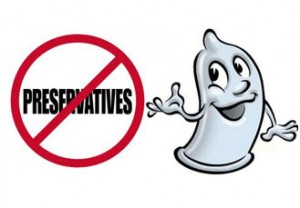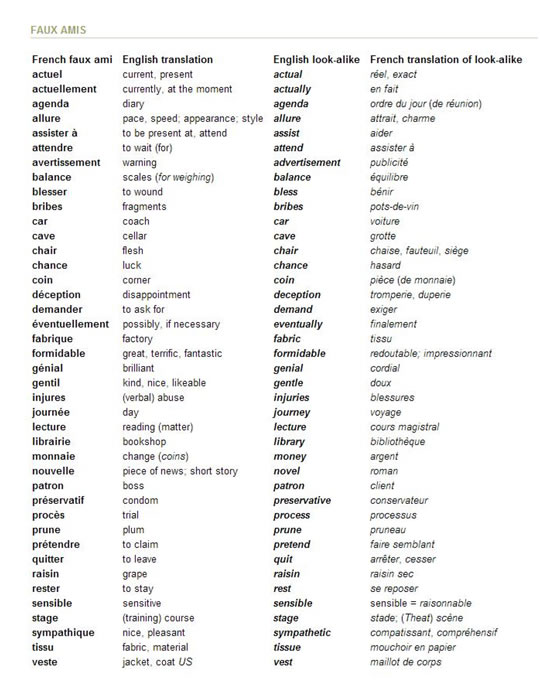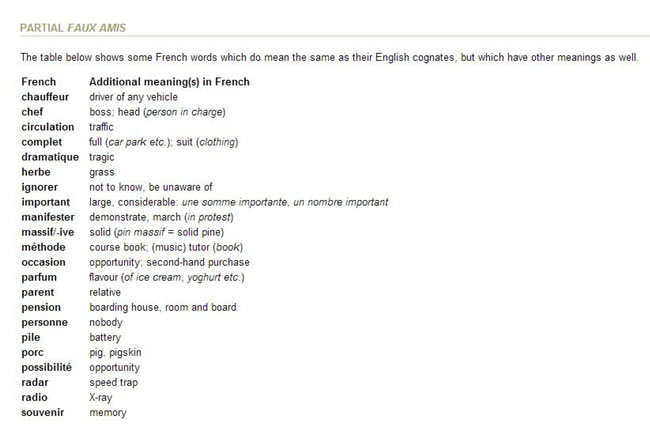Translating your website is one of the most popular strategies used to expand a business to international markets and increases sales globally. French businesses have a big opportunity in just the wide-reaching Francophone world; however offering products and services in the most widespread global languages is worthwhile. English is the logical place to start.
While having your website available in English can help increase your visibility and consolidate your reputation, the opposite can also be true. This can occur if you do not use professional translators, and your website’s SEO and online performance can be affected significantly if the right terms are not used. When it comes to English, this can happen in the form of faux amis.
So what are “faux amis”?
“Faux amis”, often referred to as “false friends” in English are two words which are similar in spelling or pronunciation, but with different meanings. These words are often translated from French to English, based on the assumption they mean the same thing, but in many cases they do not and unsurprisingly, that can cause much confusion for the reader.
This is a particularly bad translation:
Unless the above message is intended to refer to “preservatives” (substances added to food to make them last longer), the idea of the ban on condoms will be misunderstood by the reader.
It is crucial to ensure you have an accurate translation of your web content in order to avoid misinterpretation by users viewing your pages. Otherwise, all your efforts to provide quality content in their native language will be wasted and your message will be diluted.
Faux amis suggest a lack of professionalism
It is true that some faux amis called ” partial ” or ” semi faux amis ” have common meanings such as:
Adjustable (English) and ajustable ( French )
To advance (English) and avancer( French )
However, most of the faux amis are “strict ” or ” absolute”. In other words, these English words share the same etymology as their similar French versions – however have a totally different meaning. Therefore translation based solely on the similarity of the words will look unprofessional.
In fact, your attempt to grow your business by offering content in your users’ language may be doomed to fail if the translation you provide is not correct. It can cause them to question your expertise and knowledge, if the content you provide on your own website is of poor quality.
Even worse, it is not uncommon for faux amis to have alternative meanings which may actually be derogatory, obscene or insulting to your users. Using a native translator is always the best means of providing quality content and will help you develop a positive image in your industry and target country.
Faux amis can negatively affect bounce rates
Faux amis can not only lead to misinterpretation and potentially tarnish your professional image , but they can also harm your website’s SEO.
In fact, when a user views a page (usually the home page) and does not then view any other pages (e.g. product pages ), or does not perform a specific action ( e.g. purchase or reservation ) , the website’s relevance can be questioned by the search engines.
Here we think about bounce rate – how many people leave the site immediately from the page they enter on. This value can increase significantly when a user views incorrectly translated pages – as they are likely to leave your site without reacting to your call to action or looking deeper into your content, something which Google will take into account when determining rankings.
In addition, SEO is moving more and more towards a focus on the quality of content on a website. So poor translation really can damage your potential and performance from an SEO perspective, as well as user one.
Here are just some examples of French-English faux amis:
Faux amis and duplicate content
It is true that translated content is not considered duplicate content by search engines, including those from automatic translation tools like Google Translate. Penalties related to duplicate content are not applied to multilingual sites, where the pages are distinct (URL Structures, Meta Tags etc…) and where the visible content is fully translated.
However, the risk is once again related to the relevance of the content. It is possible that a bad translation of one or more pages of your website can affect its PageRank ( and therefore positioning in search engines) .
When deciding how to rank two sites offering the same products and services , Google will favour the one which has reliable and usable relevant content. If your content contains many faux amis, with no or very little similarity to the source language , it will distort your message.
Where to look for faux amis
Make sure you check all elements of your site for these potential errors:
Static content: Home page, Presentations, Terms and Conditions etc..
Dynamic content: news, product sheets , time promotions, offers etc…
Text in graphics: Image Alt tags , PDF files, guides etc…
Meta data: title meta tags , meta description and meta keywords
The URL
In order to avoid faux amis in English translations, you might want to consider creating a translation workflow that includes proofreading of all translators by a native speaker.
Applying the tips in this article and being aware of faux amis, you will improve the quality and success of your English content and ensure you present the best possible image to English-speaking potential customers.





